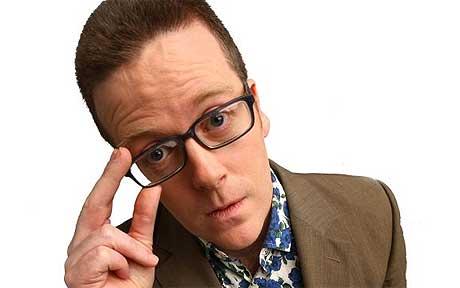If we remove our
taboos, the worst aspects of humanity are unleashed
 |
|
Taboo busting or just
mean? Frankie Boyle finds comedy material in Down's
syndrome. |
A
pitiful inquest was reported in the papers last week: it dealt with the
case of a 59-year-old man named Paul Cowling who threw himself off a
bridge after he had developed an unbearably painful skin condition and
fallen into depression.
Policemen and members of the emergency services had been patiently
negotiating with him as he stood on the edge for seven hours. At a
certain point the motorway traffic was stopped, leading to long
tailbacks, but progress was being made. Then some infuriated motorists
started shouting “Jump, you ----er” and “Jump, you b-----”, accompanied
by the tooting of a lorry horn.
Mr
Cowling heard them: tears rolled down his face and, some time after, he
duly jumped to his death. His brother later thanked everyone who tried
to help, saying: “He was a thoughtful, helpful person and would be
horrified to think he had caused a problem on the bridge.” But poor Mr
Cowling was not in his right mind.
I don’t
know what the excuse might be for the people who shouted those things.
Of course, it is maddening to be stuck in a traffic jam, and many of us
might well have uncharitable thoughts, against our better nature. Yet
the shouters openly exulted in breaking the taboo against articulating
such thoughts. They deliberately egged Mr Cowling into jumping, as a
punishment for inconveniencing them.
It is
common for the phrase “taboo-busting” to be used with breathless
admiration, as though such things are there to be destroyed by anyone
with sufficient daring. Yet taboos, although they are being dismantled
with increasing regularity, are often necessary restraints that permit
civilised society to exist: remove them, and the worst aspects of
humanity are unleashed.
Take,
for example, the ceaseless dribble of controversy about the utterances
of the Scottish comedian
Frankie Boyle. On the occasions I have
seen him on television, it has seemed to me that he is a quick-witted
man whose comedic gift is gradually being throttled by the increasingly
overpowering nature of his misanthropic shtick. Listening to him is like
walking down the street in conversation with someone who seems amusing
company, until he suddenly pauses to spit on a homeless person in a
doorway.
Mr Boyle
has recently used his stage act to ridicule children with Down’s
syndrome, including their speech, clothes and shorter life expectancy.
When that provoked an outcry, especially when he was challenged by the
mother of a five-year-old girl with the syndrome, he carried on, and
included some more lazy and unfunny jokes about
Madeleine
McCann
and Baby P. This unpleasant stuff has helped make
Boyle a big name: he is regularly described as “taboo-busting”, and his
army of loyal fans defend his comedy as something for people with strong
stomachs, rather like a very hot vindaloo.
Yet when
I consider the reasons why there is a taboo around the public mockery of
children with Down’s syndrome, or abducted or abused children, it seems
self-evidently right that it should remain. There is nothing strong
about attacking the vulnerable: kindness is a form of evolution. If a
group of 10-year-old schoolchildren were to taunt a contemporary with
Down's syndrome, describing him or her as a “mongoloid” – one of Mr
Boyle’s favourite terms – would they be miniature satirists, playing
with the audience’s notions of transgression? No. They would be nasty
bullies.
Something is changing in the nature of public discourse: it is freer,
but also more extreme and uncontrolled. The internet, despite its many
benefits, is awash with anonymous commentary of the most startlingly
abusive kind.
The
worst savagery in history has always begun with a frenzy of
taboo-busting, beginning with jeers and ending in blows. In Mao’s
Cultural Revolution, university professors were beaten up and forced to
wear dunce’s hats. In Nazi Germany, respectable elderly Jewish men had
their beards pulled in front of mocking crowds. We are not there yet, of
course, but perhaps it’s time to consider what a Britain full of busted
taboos might really look like. |



